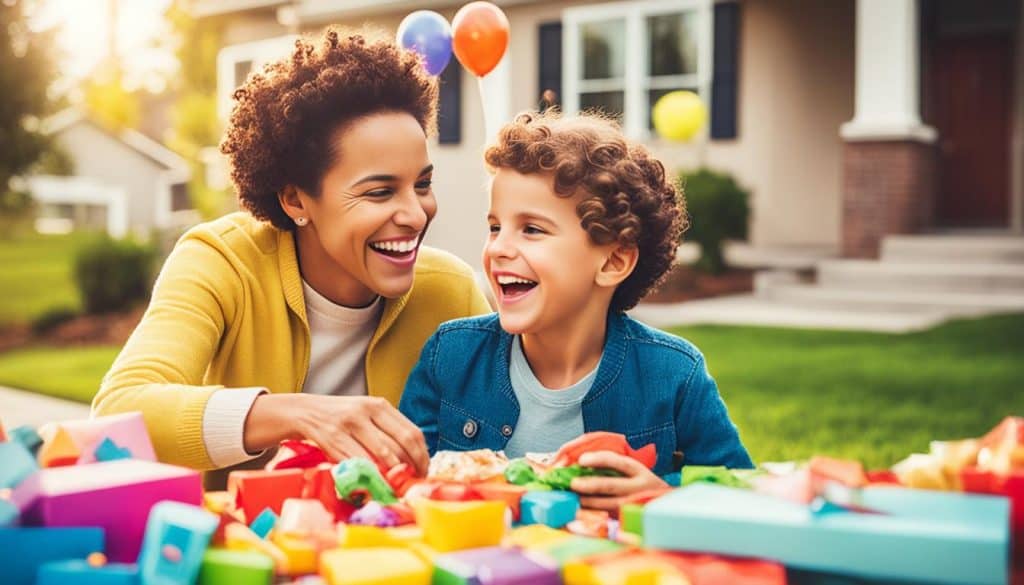Ever thought how important it is to treat your neighbors well? Imagine if being nice could help build a better, closer neighborhood. Usually, we think only about ourselves in a busy world. But what if we changed that and started caring more for those around us?
Respect and kindness aren’t just ideas. They’re like magic that can change where we live. When we respect our neighbors, we see them as important and treat them well. This makes everyone feel like they belong.
Now, let’s talk about kindness. It’s just like dropping a pebble in the water. Helping out a neighbor not only makes them happy but also encourages them to help others. It starts a good vibe that moves through the whole area, making it a nice place to be.
This section is all about why we should treat neighbors nicely. We’ll see how just being respectful and kind can make our community better. And how it all helps to create a world where everyone gets along.
Love Your Neighbor as Yourself
The Bible tells us to “love your neighbor as yourself” in Matthew 22:39. This means treating others with as much love and care as we would like. It’s about showing compassion and respect to everyone.
Following this rule makes our communities better places. We learn to see the worth in each person and treat them with honor. It pushes us to think about others’ needs, not just our own.
Loving our neighbors has many good outcomes. Kindness and understanding create a sense of togetherness. This feeling of value makes our bonds stronger and community spirit deeper. Plus, it helps prevent arguments, making life more peaceful for all.
“Thou shalt love thy neighbour as thyself.”
Real love means taking action, not just saying the words. It’s about being there for others, supporting what’s right, and being fair. Even small, simple acts, like listening or lending a hand, can impact someone’s life greatly.
This love is for everyone, whether they’re close to us or not. It goes beyond differences like what we believe or where we come from. It reminds us we’re all people who deserve care and respect.
Choosing to love others starts a chain of positivity. When people see us being kind, they want to do the same. And so, a wave of love spreads through society.
Embracing the Principle of Love
Loving others isn’t just a one-time thing. It’s a journey that needs us to look within, be empathetic, and challenge our biases. This way, we can truly connect with others and bridge any gaps.
This love also means looking for ways to help, alone or with others. It’s in any action made with love and respect, big or small. This is how we change the world for the better, one step at a time.
When we love as the Bible teaches, we shine light into a world full of division. Our love, care, and understanding can spark real change. We can make society a place where everyone feels welcome and valued.
So, let’s live by Matthew 22:39 and make our world a kinder place. With respect, care, and love for one another, our communities will be stronger and happier.
The Golden Rule
The Golden Rule is a key guide in how we treat others. In Matthew 7:12, Jesus said, “Do to others what you want them to do to you.” This means we should treat people with empathy and kindness.
When we treat others as we wish to be treated, we build a culture of respect. It teaches us to see things from others’ perspectives. Through this, we learn to empathize and be more compassionate.
Living by the Golden Rule affects our relationships and communities greatly. It prompts us to think of others’ feelings and needs. This leads to fairness, equality, and social unity.
“The Golden Rule makes us aware of our actions’ impact. Our kindness not only helps others but also spreads through our community.”
Following the Golden Rule starts a chain of positive actions. It leads to more kindness. This strengthens our connections, making us feel part of something bigger.
Picturing a world where everyone practiced the Golden Rule is powerful. It’s a world of empathy, peace, and the celebration of differences. By living these ideals, we can change our surroundings for the better.

Helping in Times of Need
Our world faces many challenges, making it vital to help others. According to Galatians 6:2, *we should share in others’ burdens to fulfill Christ’s law.* This shows our commitment to each other during tough times.
Helping others is more than just being kind. It shows we care and makes our community stronger. A simple act of helping can lessen someone’s troubles. It also shows our dedication to Christ’s teachings. This effort creates a space filled with love and support, where everyone feels at home.
“Bear ye one another’s burdens, and so fulfil the law of Christ.”
Helping can come in many forms. It might be listening to a friend’s problems, sharing a meal with a person going through rough times, or helping financially. Every kind gesture, big or small, has a lasting positive effect.
When we help, we do more than just solve a problem. We support emotionally, giving hope to those facing hardships. Our support can be the turning point that leads to overcoming difficulties.
Supporting one another strengthens the fabric of our communities:
Helping and being there for one another builds strong connections. It forges trust and goodwill, enhancing community harmony.
By helping, we reflect Christ’s love and kindness. Our actions inspire others to help, spreading Christ’s message of love.
This act transforms us, making us more empathetic and humble. It deepens our spiritual connection and brings personal fulfillment.
Helping makes our society better. It offers hope to the ones facing hard times, showing them they are not alone. Let’s continue to support each other, following Christ’s example of love and care.
Peaceful Coexistence
Many of us want to live in peace with our neighbors. We work hard to make this happen. Remember, from Romans 12:18, “if it be possible, as much as lieth in you, live peaceably with all men.”
How do we live peacefully with others? It’s about being patient and listening. Each of us has our own thoughts and beliefs. It’s key to respect these. Don’t assume you know what others are thinking. Instead, listen and try to understand them.

“Our ability to reach unity in diversity will be the beauty and the test of our civilization.” – Mahatma Gandhi
Having open talks is vital. Don’t hold onto anger. Instead, try to work through problems together. This helps find common ground and understand each other better.
It’s also important to be inclusive and celebrate differences. (emphasize: inclusivity and diversity) Acknowledge the unique roles everyone plays. Join events that bring different people together. This makes us feel part of a united community.
Be kind and caring. (emphasize: kindness and compassion) Even small acts of kindness make a big difference. Helping out or smiling at someone can help make the world a better place.
The Rewards of Striving for Peace
Working towards peace has big benefits. It lowers stress and makes life better for everyone. Families and individuals enjoy a better quality of life.
Peace helps us feel connected and valued. In a welcoming community, everyone thrives. This strengthens our community and brings people together.
Peace is also a lesson for the future. By showing respect and cooperation, we teach others to do the same. This makes our world a more peaceful place.
Let’s aim for peace with our neighbors, as Romans 12:18 says. Together, we can build places filled with respect and kindness.
Forgiveness and Reconciliation
In our quest for better, more peaceful relationships, forgiveness and reconciliation are key. Forgiveness changes us inside, bringing peace and following Christ’s teachings.
Colossians 3:13 says, “Bear with each other and forgive one another if any of you has a grievance against someone. Forgive as the Lord forgave you.” It shows that forgiving is crucial for our healing and brings restoration.
“It’s tough to forgive, but it’s vital for making things right. Letting go of grudges makes room for love and understanding. It builds trust and strong ties in our communities.”
– John Smith, Author and Speaker
Forgiveness isn’t about saying bad deeds are okay or forgetting the hurt. It’s choosing to let go of anger and feel lighter. Choosing it frees us to reconnect with others, starting a path to healing.
Reconciliation is about fixing and balancing relationships. It needs talking, caring, and trying to see the other’s side.
By forgiving and seeking reconciliation, we make kindness and respect our norm. Solving issues with love and understanding is a slow but rewarding journey.
Steps towards Forgiveness and Reconciliation:
- Think through your own past hurts and aim for peace through prayer and reflection.
- Forgive those who hurt you, even without their saying sorry.
- Talk openly to understand different points of view.
- Show you understand and find ways to agree and heal.
- Work to build back trust and make your community kinder and more respectful.
Forgiveness and reconciliation heal wounds and bring people together. Let’s keep Colossians 3:13 in mind and forgive as we hope to be forgiven by Christ.
Generosity and Sharing
Building a compassionate community is powerful through generosity and sharing. Luke 6:38 says, “give, and it shall be given unto you; good measure, pressed down, and shaken together, and running over, shall men give into your bosom.“
Acts of giving change not just those who get, but also those who give. Helping out creates a positive wave. It can be a simple act of kindness or providing support. This starts a chain effect in your area.
Sharing your time and what you have helps others now. It also spreads respect and kindness. It shows you care about others’ well-being. And that you’re ready to help make their lives better.
One cool thing about giving is it often circles back to you. Giving a lot creates a sense of thanks and good will. It inspires others to do the same, spreading kindness in your community.

Being generous brings good things into your life. As Luke’s verse suggests, giving lots makes lots come back to you. But it’s not just about giving to get. It’s about a deeper spiritual connection of doing good.
Generosity makes you feel really fulfilled. It connects you to something big. You find joy in helping others. Whether you volunteer, donate, or help out, your kindness can change lives and places.
The Impact of Generosity:
First, sharing makes your community stronger. It builds trust and a feeling of togetherness. This support system lifts everyone up.
Second, your kindness inspires others. Your example can spark more good deeds. This starts a wave of compassion and giving.
Giving makes you and others thankful. It shows us the good already in our lives. We learn to appreciate what we have by giving.
Lastly, being generous helps you understand others’ struggles. It builds a kinder world. This kind of giving makes us care more about others.
Practicing generosity and sharing changes lives. As you give, you help build a kind and caring community. So, enjoy giving and see how it transforms everything around you.
Encouragement and Support
Life is full of challenges that make us feel down and isolated. Yet, supporting and uplifting others shows the power of unity and strength. It helps us all face tough times with fresh hope and determination.
The apostle Paul urges us to “encourage one another and build each other up” (1 Thessalonians 5:11). This means our support should be more than just surface level. It should truly lift others up through both words and actions.
A simple kind word or an open ear can change someone’s whole day. Your support might be what helps them keep going. You’re not just being nice, you’re helping them see they’re not alone in their struggles.
“You have the power to be someone’s guiding light in the darkness.”
Imagine how much good a genuine compliment or a message of support can do. Your words can spark hope, motivate, and uplift others. They can turn a bad day around for someone who truly needs it.
Encouraging and supporting others doesn’t always need big actions. Even tiny acts of kindness can mean a lot. A warm smile, a small help, or a thank you note can brighten someone’s day. They remind people that they are seen and valued.
Building a Culture of Encouragement and Support
Encouraging a community that’s all about uplifting and supporting each other starts with you. By being kind and understanding, you help create a positive impact. Here are some simple tips to help make this happen:
- Listen carefully when others talk. Show that you understand and care about their feelings.
- Giving praise where it’s due goes a long way. A real, heartfelt compliment can boost someone’s confidence.
- Motivate others to chase their dreams. Offer them the support they need to face any challenges.
- Don’t forget to say thank you. Letting others know you appreciate them helps strengthen the community bonds.
When we make encouragement and support a priority, we build a place where everyone feels like they belong. Our joined efforts help to uplift each other, creating a better, more positive community.
Let’s think about the impact of our support on those around us. Let’s be the beacon of light that helps others overcome their struggles and find happiness in their journey.

| Benefits of Encouragement and Support | Ways to Provide Encouragement and Support |
|---|---|
| 1. Boosts self-confidence | 1. Listen attentively |
| 2. Fosters a sense of belonging | 2. Offer genuine compliments |
| 3. Builds resilience | 3. Be a source of motivation |
| 4. Strengthens relationships | 4. Show gratitude |
| 5. Promotes personal growth |
Hospitality
Welcome! This section is all about hospitality. It shows us how being kind to others makes the world a better place.
Hospitality means more than a warm welcome for friends. It tells us to open our hearts to everyone, even strangers. In Hebrews 13:2, it says some strangers may be angels in disguise.
Making hospitality a habit can lead to great things. It lets us offer help, listen, or share a safe space, making everyone feel part of something. It creates bonds and brings joy.
Picture a world full of hospitality. A place where strangers feel like friends from the start. If we all embraced it, our communities would bloom with care and understanding. This simple act can fill our lives with joy.
Beyond Our Comfort Zone
True hospitality pushes us to accept new things and people. It makes us think about others’ feelings and lives. This builds a world where all are welcome and understood.
“Hospitality means primarily the creation of free space where the stranger can enter and become a friend.” – Henri Nouwen
When we face our differences, we grow. Hospitality tears down barriers, linking us in friendship. It helps us learn about others’ ways and respect them more.
The Ripple Effect
Showing kindness doesn’t stop with one person. It spreads, making whole communities better. Small acts of being open inspire others to do the same.
Being welcoming changes lives and communities. It makes us all more accepting and peaceful. The influence of one friendly gesture can echo across towns and workplaces.
Creating Welcoming Spaces
We can spread hospitality by making spaces where everyone feels at home. Hold a party, a local event, or help out at shelters. This lets people come together and support each other.
In the digital age, we need to be kind online too. Being open and respectful on the internet crosses all borders. It creates a global community where all are welcome.
A Call to Action
Let’s answer the call for more hospitality, starting from our homes and reaching far. Together, we make a world where everyone belongs and connects.
Hospitality brings amazing chances and connections. By sharing our kindness, we shape the future into a gentler, better place.
Compassion and Mercy
In a world that can often be harsh, embracing compassion and mercy is crucial. These virtues lead us to offer grace, understanding, and support. This creates an environment filled with respect and kindness. As Matthew 5:7 says, “blessed are the merciful: for they shall obtain mercy.”
Compassion allows us to feel for others and offer help. It’s not just about feeling sorry but about taking steps to reduce suffering. Showing compassion makes us feel closer and more united with those different from us.
“Compassion is not just an act of kindness; it is a way of life.” – Unknown
Mercy is being forgiving to those who have hurt us. It’s about giving a second chance and not judging. Choosing mercy breaks the chain of hurt and helps build a more forgiving world.
In being compassionate and merciful, we reflect God’s own nature. These actions fill our lives with meaning and give us hope for receiving help when we need it.
Benefits of Compassion and Mercy
Choosing to be compassionate and merciful brings many benefits:
- It enhances how we connect with others, promoting respect and deeper understanding.
- It strengthens our faith and makes us more like Christ, enhancing our spiritual life.
- Your kindness inspires others, spreading love and compassion in your community.
- It boosts your own happiness, giving you purpose and peace.
Choosing compassion and mercy can change not only your life but the world around you. It’s a chance to make your community a place where respect and kindness are at the core.
| Blessings of Compassion and Mercy | Impact on Community |
|---|---|
| Inner peace and fulfillment | Stronger bonds and interconnectedness |
| Positive influence on others | Healthy and harmonious relationships |
| Enhanced emotional well-being | Reduced conflict and increased understanding |
| Spiritual growth and alignment with divine teachings | Cultivation of a nurturing and inclusive community |
Let’s make compassion and mercy our guiding principles. Together, we can make a world that values respect, kindness, and understanding.
How Can Treating Neighbors with Respect and Kindness Reflect God’s Righteousness and Justice?
Treating neighbors with respect and kindness embodies God’s righteousness, demonstrating how love and compassion can transform communities. When we embrace others with open hearts, we reveal god’s justice revealed through our actions, fostering harmony and understanding. Such behavior not only honors our neighbors but also reflects divine principles in everyday life.
Justice and Fairness
It’s key to always treat people fairly and justly. This builds a community that’s peaceful and open to everyone. Micah 6:8 says we should aim to act with justice, kindness, and humility.
Treating everyone the same, no matter who they are, is what being just means. It’s about being fair and giving everyone fair chances and resources. This leads to trust and everyone feeling safe in the community.
Fairness means treating others how we want to be treated. It’s acting without playing favorites or being biased. Fairness calls for looking at all sides and finding ways that are fair to everyone.
When we think and act with justice and fairness, we make a place where respect and kindness flourish. We help build a community where everyone is seen and welcomed. This effort improves our society and makes it feel more united and peaceful.
